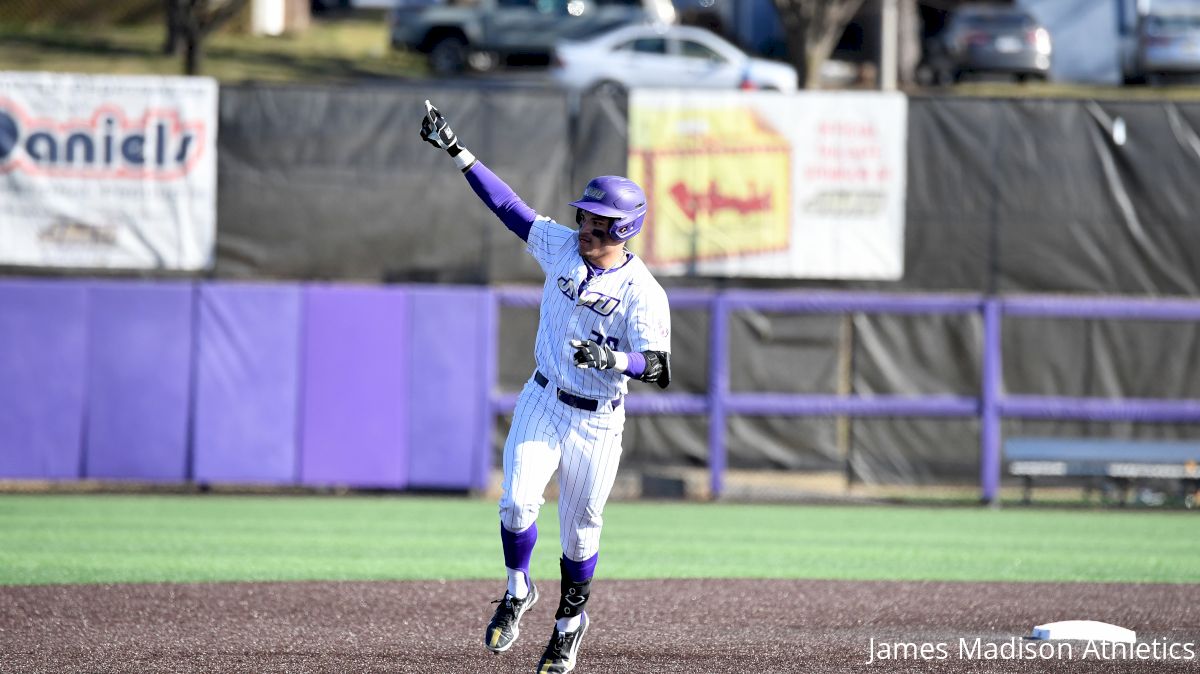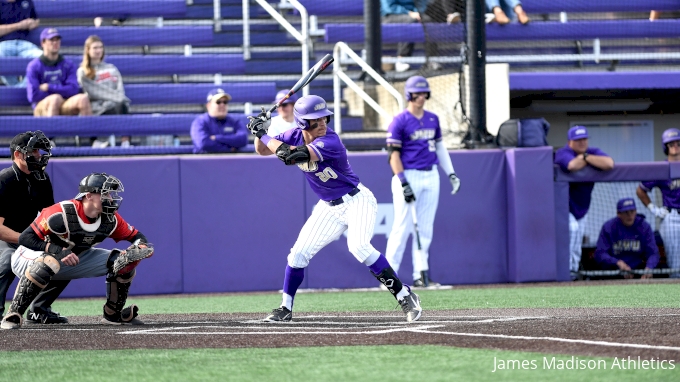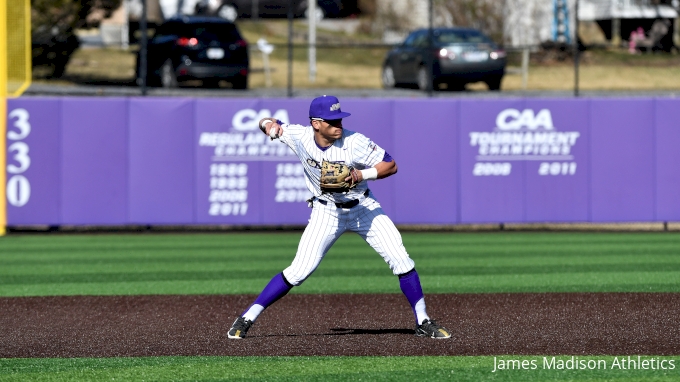JMU's Trevon Dabney Is The Definition Of A Complete Player
JMU's Trevon Dabney Is The Definition Of A Complete Player
With grit and confidence, Dabney has set himself apart from his peers and become a multi-positional leadoff hitter at James Madison.

During the summer before his senior year of high school, Trevon Dabney was participating in a Georgia showcase when he separated the pinkie finger on his right hand sliding into a base.
At first, he thought it was just jammed. But the 6-1, 190-pound James Madison junior utility player quickly realized it was broken. The clay dirt infield wasn’t something he was used to, and he miscalculated his slide.
“My finger ends up clipping the bag,” recalled Dabney, who bats leadoff in the Dukes’ lineup and plays multiple infield and outfield positions.
“But as soon as it cleared, my finger was actually sideways. There was this guy in the Marines who was at the game. He just popped it back in place and I just continued playing and taped it up.”
Dabney played mainly on the weekends that summer for the Lancaster Blackhawks, a travel team in Pennsylvania, which allowed him time to heal from the injury. But it served as an example of his mental toughness, which would be put to the test again with the Dukes.
While playing in left field during a game last season, Dabney crashed into the wall chasing down a fly ball.
“He plays so hard,” Dukes head coach Marlin Ikenberry said.
“Left field is kind of a tough place to play in this park. It’s a padded wall, but he’s a great athlete. It’s basically a freight train hitting a wall.”
At Berks Catholic High School, Dabney played baseball, football and basketball. His paternal grandfather once told him he had an opportunity to try out for the Negro Leagues, but had already begun raising a family and decided against it. That story is the main reason Trevon chose baseball over all the other sports.
“I wanted to keep his name around and play baseball essentially for him,” Dabney explained.
“I’ve been playing baseball my whole life. That’s what I work at the most.”
Ikenberry, now in his seventh season as head coach of the Dukes, first encountered Dabney at a JMU baseball camp. The Blackhawks only had eight players that weekend, and almost canceled. But Ikenberry persuaded the team to come, promising to provide substitute players if needed.
One of the players who made the trip was Dabney, who played shortstop during the camp. He didn’t take long to get noticed.
“He played with a ton of energy all over the field, could run, throw, play defense,” Ikenberry recalled.
“We didn’t know much about him because he didn’t play that much that summer because he broke his finger. We saw him play in a tournament a couple weeks later and ended up getting him to commit here, knowing he was a three-sport athlete.”
Dabney quickly established his presence in JMU’s lineup his freshman year. He played third base most of that season, starting all 53 games. He hit .306 with six home runs, two of which came in the leadoff spot on back-to-back days. He led the team with 17 steals and 14 doubles. He also collected four RBI in the season opener against Norfolk State.

Dabney attributes his early success to one simple factor: confidence.
“Once you develop confidence and the team believes in you, it makes it easier to play,” Dabney said.
“At the end of the day, baseball is played the same way. It’s the same as high school, just at a higher level and maybe a bit faster. But baseball is baseball. If you just calm everything down and play the game you’ve been playing your whole life, it really calms your nerves.”
After the season, Ikenberry called Dabney into his office and asked how he would feel about playing the outfield. A spot was opening up in center field, and Ikenberry wanted to take advantage of Dabney’s speed. Plus, it would provide more flexibility in the lineup.
Dabney didn’t hesitate.
“Yeah, of course,” he told Ikenberry.
“As long as I’m in the lineup, I really don’t care where I’m playing. I could be a catcher if I wanted to.”
Dabney hasn’t been behind the plate, but does play center and left field as well as third base. During batting practice, Ikenberry employs two defensive rotations with many of his players. Dabney may play third base during one rotation, and an outfield position in another.
“It gives you a lot of versatility in matchups,” Ikenberry explained.
In the pandemic-shortened 2020 season, Dabney started four of the six games he appeared in, batting .231 with a .375 OBP. Last season, he finished with a .274 average, scored 12 runs while driving in five over 17 games.
“(Pitchers) don’t want to walk him, but he knows how to take his walks and get hit by pitches,” Ikenberry said.
“When he does get pitches to hit, he usually stays on them and hits them hard.”

Dabney’s ability to hit for power and draw walks makes him especially valuable at the top of the batting order. Through 27 games, he’s batting .327 with six homers and 21 walks. He’s also been hit 14 times.
Outfielder/pitcher Chase DeLauter, ranked No. 1 in Perfect Game’s Top 150 College Draft Board, provides a left-handed power bat behind Dabney in the No. 2 spot. His six home runs tied him with Dabney for the team lead. DeLauter’s power gives Dabney more pitches to hit.
“I really take pride in seeing pitches, getting on and starting up something for our momentum the rest of the game,” Dabney said.
The Dukes have already hit five grand slams this season, setting a new single-season program record. Dabney and DeLauter have each hit two, becoming the 11th and 12th players in program history to hit that many in a season. For Dabney, there’s no extra motivation when runners are on base—he’s just up there to hit.
“I’m just trying to do a job,” he said.
“I essentially just try to hit the ball somewhere hard. If I think about it too much, I get overanxious and swing out of the zone and do things I normally don’t do.”
Dabney wears a bracelet with the phrase, ‘let your faith be bigger than your fear’ inscribed on it. It’s a reminder to let his faith guide him in everything he does. A Type 1 diabetic, he is diligent about watching his diet and taking his shots.
“Some people may look at me and they don’t even know because I handle it so well,” he explained.
A sport and recreation management major and business minor, Dabney’s dream is to one day create a sports center where kids from all backgrounds can work out at a reduced price. When he’s home from school, the gyms he sees are often overpriced for what they’re offering.
“I want to do the same thing, but not cost as much money, just helping these kids out and have them make their dream.”